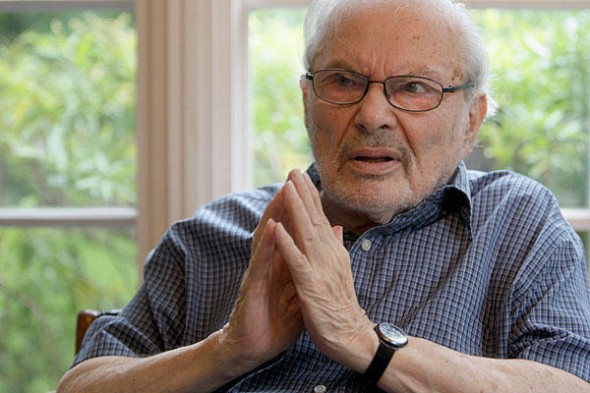 Maurice Sendak, author of the famous Where the Wild Things Are, died yesterday at the age of 83. He was one of those creators of children’s literature that librarians feel particularly possessive of, one of our last living “national treasures” like Eric Carle, Beverly Cleary, or Ed Emberley. Still making incredible works of art that tap into the heart of childhood, the perspective of children, that magic, at an age when most have long forgotten what it is to be childlike. He did not shy away from dark themes for children, which certainly stemmed from his own childhood experience as a Jewish kid from Brooklyn who lost several family members in the war and had severe health problems. It always made him controversial, but for anyone who has ever read one of his books to a child or as a child you know that he got to the bones of those great big feelings–which most adults try to shield from children. Sendak knew that this does children a great disservice, denying that they can feel darkly or understand deeply.
Maurice Sendak, author of the famous Where the Wild Things Are, died yesterday at the age of 83. He was one of those creators of children’s literature that librarians feel particularly possessive of, one of our last living “national treasures” like Eric Carle, Beverly Cleary, or Ed Emberley. Still making incredible works of art that tap into the heart of childhood, the perspective of children, that magic, at an age when most have long forgotten what it is to be childlike. He did not shy away from dark themes for children, which certainly stemmed from his own childhood experience as a Jewish kid from Brooklyn who lost several family members in the war and had severe health problems. It always made him controversial, but for anyone who has ever read one of his books to a child or as a child you know that he got to the bones of those great big feelings–which most adults try to shield from children. Sendak knew that this does children a great disservice, denying that they can feel darkly or understand deeply.
If I’m honest, I don’t love all of his books. But I loved him, and I love what he believed in for children’s literature. I’ve read stories from other authors about how he inspired them, helped them find their voice. Brian Selznick in particular credited Sendak in his Caldecott acceptance speech for The Invention of Hugo Cabret, and you know how I feel about that book (if you don’t, search for Hugo Cabret on this blog–you’ll see). He paid it forward, and genius like Selznick shine because of it.
I think it’s worth noting as well that Sendak died on a day when much is being said in the news about gay marriage in this country. Much is being made about “God’s design for marriage,” and once again there are people hiding their personal prejudices behind an ancient book. Maurice Sendak was a gay man who lived with his partner, Dr. Eugene Glynn, for 50 years before Glynn died. FIFTY. YEARS. That is a miraculous amount of time for any couple, and I don’t know how much more proof is necessary that love is equal and therefore marriage should be, too. If you believe in God do you really think those two would not be reunited in heaven? That’s not a heaven I’d want to put my faith behind.

I agree with you 100%, Jackie! I’m sad that he’s gone and won’t be creating magical things for children anymore. I was never in love with his books, but he wasn’t writing them for me!! My students love those books, and that’s all that matters.
I didn’t know that Sendak was gay until reading his NYT obituary, but what a wonderful tribute to love. Good for them. I, too, hope they’re reunited in heaven!
Everybody’s entitled to their opinion and you’ve expressed yours well. Respectfully, I disagree with you.
Thanks for saying it for me. I am reading him all week, we are watching him on youtube, and one of the great, odd, fitting moments he had was playing a rabbi in the Angels in America TV version (the latter not for children). I loved the man (which probably would have annoyed him) and along with James Marshall and Arnold Lobel, he is a touchstone of childhood. And FIFTY. FREAKING. YEARS! That is love.